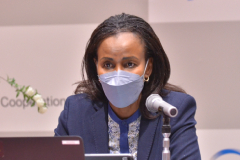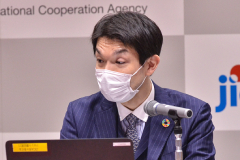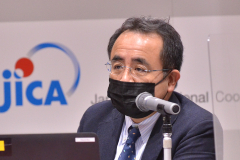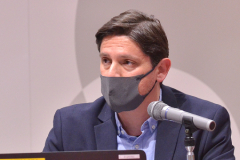Joint Seminar: The Progress of the World Bank Group’s Fragility, Conflict, Violence Strategy and Collaboration with JICA
2023.03.27
Fragility, conflict, and violence (FCV) present critical development challenges that threaten efforts to end extreme poverty in both low- and middle-income countries. On Feb. 21, 2023, representatives from the World Bank met with their counterparts from JICA to review the progress both have made, often together, on reducing the incidence and severity of FCV affecting development. Omori Koichi of the World Bank, who moderated the seminar, commenced the event by introducing the discussion framework and speakers.
Soukeyna Kane, director of the FCV Group of the World Bank gave a keynote speech outlining the size and evolution of the problem of conflict. She observed that not only have the number of conflicts increased but they have also become more protracted. Conflict duration has nearly doubled, the average in 1990 was 16 years but by 2020 it was over 30 years, with reignited conflicts more common than new ones.

Soukeyna Kane, director of the FCV Group of the World Bank
She pointed out that poorer countries are assumed to be more prone to FCV than middle-income ones. Yet, over the past decade, there have been more FCV problems in middle-income countries than low-income ones. Thus, growth can mask deep social fragility that must be understood before we can reduce extreme poverty. To address the drivers and impacts of economic and social fragility, conflict, and violence, and to build resilience in vulnerable and marginalized populations, the World Bank Group launched its first FCV Strategy in 2020. Kane identified four strategic challenges that need to be addressed: improving the Bank’s ability to adapt to volatile situations, investing in resilience and crisis preparedness, addressing FCV challenges in middle-income countries, and the better use of de-risking approaches to leverage private sector engagement.
Next, Murotani Ryutaro, senior director and head of the Office for Peacebuilding, Governance and Peacebuilding Department at JICA, outlined JICA’s three approaches to FCV problems: building resilient states and societies to prevent conflicts; focusing on local governments and their capacity development and trust building with local communities; and promoting the humanitarian-development-peace (HDP) nexus. As for the HDP nexus, he provided an example from Uganda, which maintains an open-door policy for refugees. In his comments we can see how JICA’s cooperation for capacity development for rice cultivation in Uganda was extended to both locals and refugees, benefiting both. The training provided to refugees will enable them not to rely only on humanitarian aid but become self-reliant and thus to improve their lives and livelihood. He also expressed his hope to partner with the World Bank on FCV challenges through shared assessment and operational collaboration in certain fragile contexts.

Murotani Ryutaro, senior director and head of the Office for Peacebuilding, Governance and Peacebuilding Department at JICA
Matsunaga Hideki, director general, the Middle East and Europe Department at JICA, then gave an overview of the ongoing FCV problems in Ukraine. About 7.9 million refugees from Ukraine are recorded so far across Europe, with an additional 6 million people internally displaced across Ukraine. JICA in partnership with the World Bank have been supporting Ukraine with an Emergency Economic Recovery Development Policy Loan. He also touched on the FCV landscape of the Middle East, taking up the ongoing Syrian Crisis that has generated 6.7 million internally displaced people and 6.6 million refugees. He then went on to discuss the specifics of collaboration in the World Bank-JICA Partnership through programs like the Global Concessional Financing Facility (GCFF).

Matsunaga Hideki, director general, the Middle East and Europe Department at JICA
Muto Ako, executive senior research fellow at the JICA Ogata Research Institute, introduced the Institute’s research project“Contextualizing International Cooperation for Sustaining Peace: Adaptive Peacebuilding Pathways,” which examines contemporary forms of international cooperation for conflict resolution and peacebuilding. It explores a new approach to build sustaining peace, the adaptive peacebuilding approach. The premise of the adaptive approach is that for peace to be self-sustaining, resilient social institutions that promote and sustain peace must emerge from within a society. International actors can support mediation and peacebuilding and promote an inductive process that maximizes local capacity. The outcome of this research project has resulted in two academic books, “Adaptive Mediation and Conflict Resolution: Peace-making in Colombia, Mozambique, the Philippines, and Syria,” and “Adaptive Peacebuilding: A New Approach to Sustaining Peace in the 21st Century.”

Muto Ako, executive senior research fellow at the JICA Ogata Research Institute
Rui Saraiva, research fellow at the JICA Ogata Research Institute, presented a case study on evolving peacebuilding approaches in Mozambique. He noted that adaptive approaches to mediation and peacebuilding have had more positive outcomes than earlier attempts driven by externally imposed concepts. Peace needs to emerge from within to be self-sustainable and peacebuilding programs should stimulate self-organization and resilience. Localized international non-governmental organizations such as the Community of Sant’Egidio and the Aga Khan Development Network provide examples of how international peacebuilders can contribute to sustaining peace through adaptive approaches. This focus is part of a more holistic approach to peacebuilding.

Rui Saraiva, research fellow at the JICA Ogata Research Institute
Following the panelists’ remarks, Kane pointed to the complementarity in development strategies between the World Bank and JICA, saying that their collaboration on the FCV program is important for a very simple reason. It allows the World Bank to bypass the restrictions that it has in working on political institutions or other social and political areas, in which bilateral organizations like JICA have a comparative advantage.

事業事前評価表(地球規模課題対応国際科学技術協力(SATREPS)).国際協力機構 地球環境部 . 防災第一チーム. 1.案件名.国 名: フィリピン共和国.

事業事前評価表(地球規模課題対応国際科学技術協力(SATREPS)).国際協力機構 地球環境部 . 防災第一チーム. 1.案件名.国 名: フィリピン共和国.

事業事前評価表(地球規模課題対応国際科学技術協力(SATREPS)).国際協力機構 地球環境部 . 防災第一チーム. 1.案件名.国 名: フィリピン共和国.

事業事前評価表(地球規模課題対応国際科学技術協力(SATREPS)).国際協力機構 地球環境部 . 防災第一チーム. 1.案件名.国 名: フィリピン共和国.

事業事前評価表(地球規模課題対応国際科学技術協力(SATREPS)).国際協力機構 地球環境部 . 防災第一チーム. 1.案件名.国 名: フィリピン共和国.
scroll